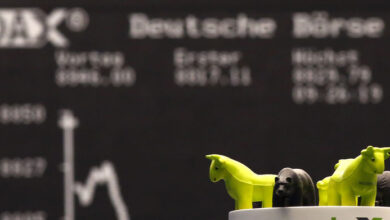Futures on European stocks decline; German retail sales surprise positively.

As investors express concern over tighter monetary policy and a declining global economy, it is anticipated that European stock markets will open lower on Thursday, kicking off the new month on a gloomy note.
At 02:00 ET (06:00 GMT), the DAX futures contract in Germany was trading 0.6% down, the CAC 40 futures contract in France was trading 0.5% lower, and the FTSE 100 futures contract in the United Kingdom was trading 0.6% lower.
Chinese manufacturing production contracted in August, according to statistics from a private poll released on Thursday, as COVID lockdowns and a drought-induced energy shortage impacted industrial activity in the world’s second-largest economy and main regional development engine.
Related: Futures on European equities are rising; Eurozone CPI data is in the spotlight.
The reading for the Caixin manufacturing purchasing managers index in August was 49.5, which was lower than the reading for July, which was 50.4. A reading below 50 means that the manufacturing sector is shrinking.
Back in Europe, there was some encouraging news as German retail sales grew 1.9% month-over-month in July, despite a 2.6% annual decline, as consumers in the largest economy of the Eurozone showed some resiliency with discretionary spending despite surging prices.
Still, this may be the only bright spot as most central banks keep raising interest rates to try to stop inflation from reaching record highs and oil prices from going through the roof.
Inflation in the Eurozone set a new record high in August, jumping to 9.1% on an annual basis, according to data released on Wednesday.
The head of Germany’s central bank asked the European Central Bank to take “decisive” steps to lower inflation, and most people expect a 75-basis-point rate hike at the policy meeting next week.
The German manufacturing PMI for August and Eurozone unemployment statistics for July are both planned for release during this session.
In business news, Rio Tinto (LON:RIO) will be in the limelight after agreeing to acquire Turquoise Hill Resources for around $3.3 billion. Rio owns 51% of Turquoise Hill right now, and this agreement ends almost six months of talks about buying the company. It also comes just a few weeks after Turquoise Hill turned down a cheaper offer.
Related: Futures have recovered from the Jackson Hole jolt; data are awaited.
Oil prices went down on Thursday, after going down for the third month in a row in August. This was the longest losing streak since April 2020. Concerns that slowing growth could hurt global demand overshadowed a big drop in U.S. oil stocks.
The U.S. Energy Information Administration said this week that oil stocks declined by more than 3 million barrels, which was greater than anticipated, while gasoline inventories fell for the fourth consecutive week.
By 02:00 ET, U.S. crude futures were trading 0.7% lower at $88.96 per barrel, while the Brent contract was 0.6% lower at $904. Both benchmarks dropped around 5% last month and more than 20% in the three months leading up to August.
In addition, gold futures declined 0.5% to $1,718.30/oz, while EUR/USD slipped 0.4% to 1.0017.





